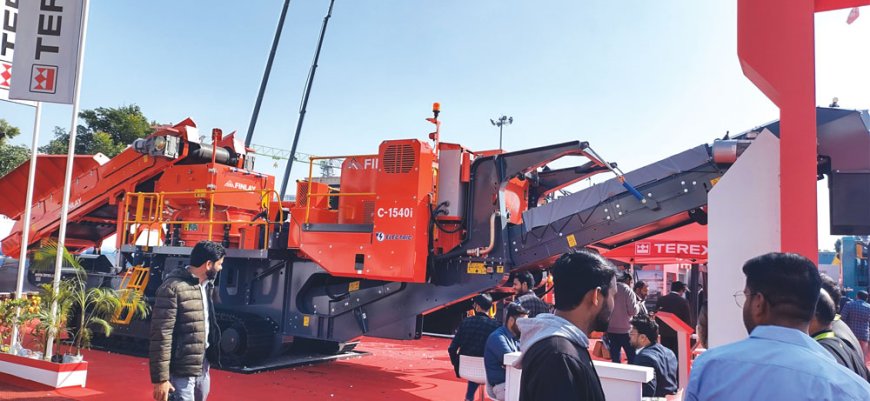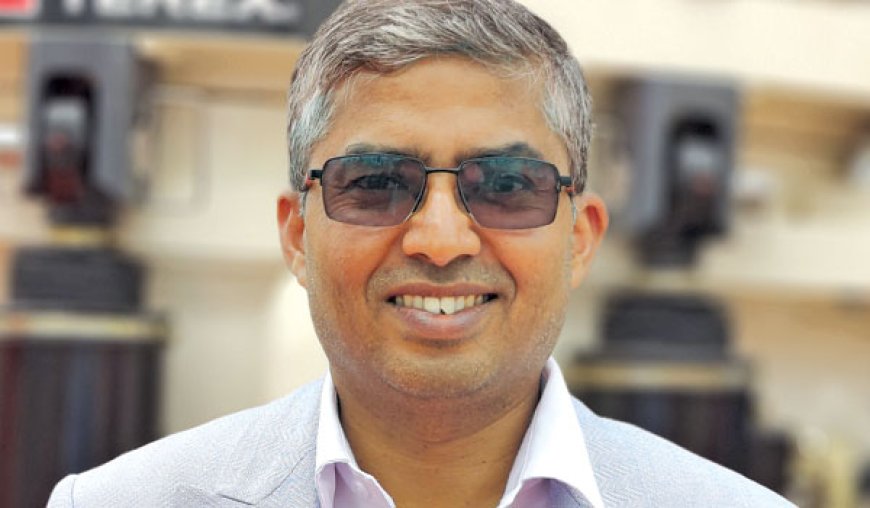Amol Sinha
Director, Product & Training, Terex India
How do you view Bauma CONEXPO INDIA? What are the technologies and solutions showcased?
Bauma is an excellent event—well-organized and well-promoted, especially this time. We are showcasing innovative products with a focus on electrification. Our machines, which were previously driven by hydraulics & engines, are now electrically driven while retaining full mobility. This shift reduces fuel consumption, spillage, compliance issues, and simplifies fuel management, enhancing sustainability and operational efficiency.
Are you gradually shifting your focus to electric-driven machines?
Yes, electrification is a key mega-trend we are pursuing. Along with electric-driven machines, we are incorporating advanced technologies like telematics and digital tools, with a strong focus on safety. For instance, our MPS crushers feature much larger and safer designs with numerous safety features built in. Additionally, our newly launched 25-tonne pick-and-carry crane is designed with safety in mind, further demonstrating our commitment to innovative, safe, and efficient solutions.
How is market demand growing, and how has the response been to your innovations?
The market has shown robust demand, particularly for our innovative solutions. Products like the Franna cranes, which offer unique capabilities as pick-and-carry machines with large capacities, have received an overwhelmingly positive response. Similarly, our mobile impactors designed for recycling applications, such as construction and demolition (C&D) recycling and recycled asphalt processing, have attracted significant interest. These products align with evolving market needs and reflect a strong emphasis on sustainability.
Our focus on greener technologies, including electrification and biofuel compatibility, has further resonated with customers seeking efficient, environmentally friendly solutions. This sustained demand showcases the industry's recognition of our commitment to innovation, sustainability, and performance-driven products.

How do you view the 'Make in India' initiative?
'Make in India' has always been part of our DNA. We were among the first to localize cone crushers in India, which were previously imported from overseas. Since 2010-11, all our cone crushers have been made in India with significant Indian engineering. This shift demonstrates our long-standing commitment to manufacturing excellence within the country.
Over time, we have transitioned from 'local for local' to 'local for global.' This means we now design machines in India not only to serve the domestic market but also to export to global markets such as the US, Germany, Japan, and more. Each region has unique requirements, and our ability to tailor solutions to these needs from India reflects our engineering and manufacturing capabilities. Our machines now meet diverse demands across Africa, Asia, Europe, North America, South America, and beyond.
Which markets are driving the demand for your products?
In addition to the aggregate and mining segments, recycling is emerging as a key market driving demand for our products. We are seeing increased interest in solutions for recycling municipal solid waste (MSW) and refuse-derived fuel (RDF). For instance, we have introduced shredders and showcased them at events like IFAT, alongside trommels designed specifically for solid waste recycling.
The aggregate market also shows strong demand for M-Sand solutions, which we have been championing for over a decade. Our fine cone crushers are energy-efficient and produce significantly less waste compared to traditional VSI methods. By catering to these diverse and growing markets, we are aligning our products with both current and future industry needs.
What are your manufacturing expansion plans?
We are significantly expanding our manufacturing capabilities to meet growing demand. New production lines have been added for various product categories, including pick-and-carry cranes, recycling equipment, large cone crushers, and electrical panels for electric plants. These expansions are focused on enhancing both capacity and quality to support our diverse and growing product line-up.
We are also building in-house capabilities for electrification work, ensuring that our electric plants are equipped with advanced electrical panels. This growth strategy reflects our commitment to meeting market demand while maintaining high standards of innovation and operational efficiency.
How was the business performance in 2024, and what are your expectations in 2025?
2024 was a strong year with growth across both conventional and new products. We introduced 7-8 new products, and our outlook for 2025 is even stronger, with a robust demand pipeline. Key focus areas include pick-and-carry cranes, electrified track plants, large jaw crushers, cone crushers, and recycling equipment. We expect additional demand from new applications and products, setting the stage for significant growth in 2025.
What challenges do OEM manufacturers face from a policy perspective?
One of the primary challenges OEM manufacturers face is the lack of clarity in policies, especially regarding emission norms for hybrid and electric machines like mobile crushers. These machines often combine diesel and electric components, creating uncertainty about how they should be categorized or regulated.
Moreover, current policies are not fully adapted to the emerging technologies being implemented in these machines. Manufacturers request clearer guidelines that balance environmental goals with practical considerations. Sudden, strict requirements can lead to higher costs, making it challenging for manufacturers to remain competitive while adhering to sustainability objectives. Policy frameworks need to encourage innovation and the adoption of environmentally friendly machines without disproportionately increasing operational costs.









